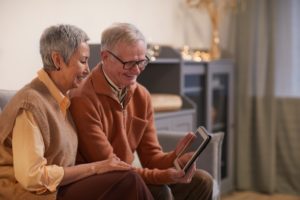10 Tips to Keep Seniors Safe at Home
 Whether you have a loved one, family member, friend, or neighbor who is growing into their sunshine years, it is extremely important to ensure their home is safe for people of their growing ‘maturity’. As my own parents grow older, I’ve become more aware of their changing needs as they age in place. Here are some ways we can help seniors stay safe when they’re at home.
Whether you have a loved one, family member, friend, or neighbor who is growing into their sunshine years, it is extremely important to ensure their home is safe for people of their growing ‘maturity’. As my own parents grow older, I’ve become more aware of their changing needs as they age in place. Here are some ways we can help seniors stay safe when they’re at home.
1. Keep emergency numbers close
Keep emergency numbers close to a phone and in places around the house. It’s important that these numbers are in bold print and easy to read and include:
- Emergency services number
- Poison control number
- Family member or friend
- Doctor’s office
2. Preventing falls
Older people are more prone to slips, trips, and falls. One helpful tool is a special alarm bracelet or necklace with an easy-push button that alerts help. Special exercise programs or actions can be taken to prevent falls in the future. While caring for my parents, I arranged for alarms to be installed in their home, as it gave us all peace of mind. Also, I encouraged them to buy non-slip footwear.
3. Safety-proofing home
As my parents got older, I assessed the furniture they had. Anything that was heavy, with sharp points, or bulky could cause accidents, as they have limited mobility. I changed out anything that would cause them problems. Make sure hallways and stairs are clear of any objects that could get in the way and that lighting is sufficient.
4. Protecting against fire and related dangers
Every home needs protection against fire, but seniors need a little more help with this. I programmed my parents’ phones with the appropriate emergency numbers, so they can get to them quickly. Keep an eye out for candles and other open flames in the home. It’s also a good idea to remind your loved ones not to cook in loose clothing, to avoid danger.
5. Avoid bathroom hazards
When thinking of at-home safety for seniors, you’ll think of the bathroom. That’s where I started with my parents. For example, I ensured that the thermostat for hot water was set at a temperature that would not cause scalding. It is important to have grab bars and assistance seats installed in bathrooms as preventative measures. Add in features your loved ones may need, as appropriate. While unsecured rugs are a fall hazard in themselves, if your loved one has a bath mat, ensure it’s non-slip.
6. Prevent carbon monoxide poisoning
Carbon monoxide is a deadly gas that cannot be seen or smelled. Because of this, I’ve reminded my parents not to heat the home with the stove, oven, or grill. I also ensure that there is a carbon monoxide detector in the house and regularly test to see if it is working, replacing batteries two times a year.

7. Be careful with medications
It is important to keep all a senior’s medicines in their labelled (original) containers and ensure they do not get mixed up. Ask the pharmacist for labels in easy-to-read bold print. When my parents go to their doctor, they take all their medications in a bag, just to ensure everything is up to date and no medicines will adversely interact with others.
8. Be knowledgeable of cleaning products
Cleaning products might be meant to help if used in the right way. I help my parents by taking on cleaning tasks, so they don’t need to worry about side effects of strong chemicals or smells. If you aren’t able to do that, ensure they know what products are safe to use. Never mix bleach, ammonia, or other cleaning liquids together, as when they are mixed they could create dangerous gases or become deadly.
9. Protect against intrusion
Make sure your loved one keeps their home secure and their windows and doors locked at all times. Never let them allow strangers into their house or fall victim to door-to-door scams. I have spoken with my parents to ensure they know only to allow service people in if they can prove who they are. I’ve also ensured they know to bar entry if they’re even slightly unsure. If the caller is legitimate, they will understand this.
10. Check in with them – frequently
This is easy, as you’ll want to see your loved ones frequently. Remember, it’s hard for some seniors to admit they need help, so it’s always best to drop by and see how they are. I visit my parents a few times a week, whether it’s to drop off some shopping, repair something, or just have a chat. If you don’t live close, ask a friend or neighbor to be your eyes from time to time.
About the Author:
Lauren Groff is an online article writer and blog editor for BoomEssays and OX Essays. She contributes her work to many other online publishing companies and papers like Masters Writing Service.
Photos from pexels.com.